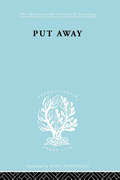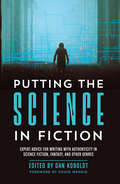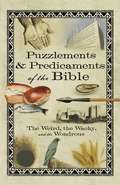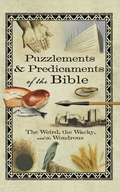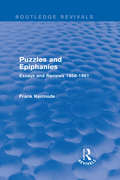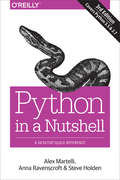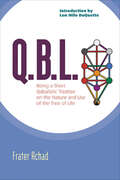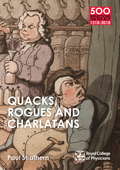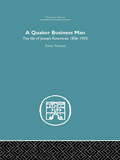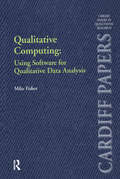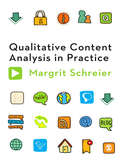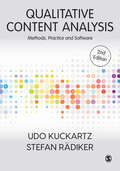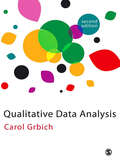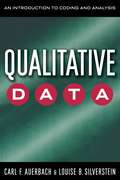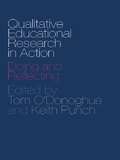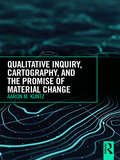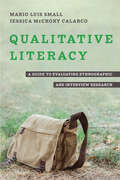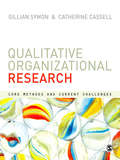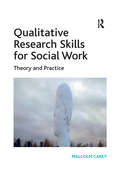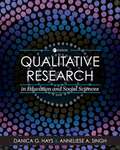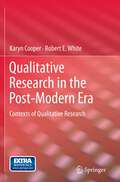- Table View
- List View
Push, Pull, Empty, Full: A Book of Opposites
by Tana HobanIn this concept book, young children learn about opposites--day/night, thick/thin, big/little...
Put Away Ils 265: Institutions For The Mentally Retarded (International Library of Sociology)
by Pauline MorrisThis is Volume VI in a series of seven on the Sociology of Mental Health. Originally published in 1969, and using language of the time, this is a sociological study of institutions and hospitals for those with mental health conditions.
Puthumaipithan Sirukathaigal
by PuthumaipithanThis is a collection of 30 popular short stories by Puthumaipithan, the veteran Tamil author, belonging to various genres, and thus a useful reference text for people interested in Tamil fiction.
Putting the Science in Fiction: Expert Advice for Writing with Authenticity in Science Fiction, Fantasy, & Other Genres
by Chuck Wendig Dan KoboldtScience and technology have starring roles in a wide range of genres--science fiction, fantasy, thriller, mystery, and more. Unfortunately, many depictions of technical subjects in literature, film, and television are pure fiction. A basic understanding of biology, physics, engineering, and medicine will help you create more realistic stories that satisfy discerning readers. This book brings together scientists, physicians, engineers, and other experts to help you:Understand the basic principles of science, technology, and medicine that are frequently featured in fiction.Avoid common pitfalls and misconceptions to ensure technical accuracy.Write realistic and compelling scientific elements that will captivate readers.Brainstorm and develop new science- and technology-based story ideas.Whether writing about mutant monsters, rogue viruses, giant spaceships, or even murders and espionage, Putting the Science in Fiction will have something to help every writer craft better fiction.Putting the Science in Fiction collects articles from "Science in Sci-fi, Fact in Fantasy," Dan Koboldt's popular blog series for authors and fans of speculative fiction (dankoboldt.com/science-in-scifi). Each article discusses an element of sci-fi or fantasy with an expert in that field. Scientists, engineers, medical professionals, and others share their insights in order to debunk the myths, correct the misconceptions, and offer advice on getting the details right.
Puzzlements & Predicaments of the Bible
by Linda Washington Betsy Todt Schmitt Gene SmillieExplore a new world of biblical adventure and excitement through this entertaining collection of stories. There are many trivia games in society today -- from radio programs and board games to online quizzes and contests. People love those little-known facts that most of the time escape our attention. Puzzlements & Predicaments of the Bible takes great truths of Scripture and translates them into easily learned tidbits of information in an innovative manner. This book will keep readers wanting more as they cover sections, such as "Curious Crimes," "Baffling Behavior," "Sinister Schemes," "Momentous Miracles," and "Exceptional Escapes," as well as chapters titled "The Night Stalker," "A Donkey's Tale," "Dead Man Walking," "Grapes of Wrath," and "A Wife Unmourned." Riveting and compelling, these tales will entertain and inform without fail. Puzzlements & Predicaments of the Bible's fresh approach to the Bible reveals a variety of facts and stories that will have the words jumping off the page, alternately surprising and sobering readers as they are brought to a better understanding of God's Word.
Puzzlements & Predicaments of the Bible
by Howard BooksExplore a new world of biblical adventure and excitement through this entertaining collection of stories. There are many trivia games in society today -- from radio programs and board games to online quizzes and contests. People love those little-known facts that most of the time escape our attention. Puzzlements & Predicaments of the Bible takes great truths of Scripture and translates them into easily learned tidbits of information in an innovative manner. This book will keep readers wanting more as they cover sections, such as "Curious Crimes," "Baffling Behavior," "Sinister Schemes," "Momentous Miracles," and "Exceptional Escapes," as well as chapters titled "The Night Stalker," "A Donkey's Tale," "Dead Man Walking," "Grapes of Wrath," and "A Wife Unmourned." Riveting and compelling, these tales will entertain and inform without fail. Puzzlements & Predicaments of the Bible's fresh approach to the Bible reveals a variety of facts and stories that will have the words jumping off the page, alternately surprising and sobering readers as they are brought to a better understanding of God's Word.
Puzzles and Epiphanies: Essays and Reviews 1958-1961 (Routledge Revivals)
by Sir Frank KermodeThis book, first published in 1962, is a collection of twenty-four essays written by Frank Kermode between 1958 and early 1961, and are all concerned with criticism and fiction. Puzzles and Epiphanies: Essays and Reviews 1958-1961 includes essays on the works of James Joyce, William Golding, E. M. Forster, and J. D. Salinger, amongst many others. This book is ideal for students of literature.
Python in a Nutshell: A Desktop Quick Reference
by Alex Martelli Anna Ravenscroft Steve HoldenUseful in many roles, from design and prototyping to testing, deployment, and maintenance, Python is consistently ranked among today’s most popular programming languages. The third edition of this practical book provides a quick reference to the language—including Python 3.5, 2.7, and highlights of 3.6—commonly used areas of its vast standard library, and some of the most useful third-party modules and packages.Ideal for programmers with some Python experience, and those coming to Python from other programming languages, this book covers a wide range of application areas, including web and network programming, XML handling, database interactions, and high-speed numeric computing. Discover how Python provides a unique mix of elegance, simplicity, practicality, and sheer power.This edition covers:Python syntax, Object-Oriented Python, standard library modules, and third-party Python packagesPython’s support for file and text operations, persistence and databases, concurrent execution, and numeric computationsNetworking basics, event-driven programming, and client-side network protocol modulesPython extension modules, and tools for packaging and distributing extensions, modules, and applications
Q.B.L.: Being a Short Qabalistic Treatise on the Nature and Use of the Tree of Life
by Frater AchadQ.B.L. is a unique work in both Qabalah and Thelemic circles. In the world of the Qabalah, Frater Achad revealed revolutionary new principles that caused students of the Qabalah to reexamine and thus deepen their knowledge of the Tree of Life. In Thelemic circles, Aleister Crowley named Frater Achad his magical heir and Achad was fully expected to lead the cause of Thelemic Magick after Crowley's death--until publication of this book caused a rift between the two and Crowley began to distance himself from Achad. This is a rare and valuable book, both for its insight and circumstances. True understanding of the Qabalah and its benefit in magical practice is clearly described, and the information contained is both practical and revelatory. The circumstances surrounding it--Frater Achad's falling out with Crowley and eventual descent into apparent insanity--prove a valuable lesson and warning for individual seekers and those associated with established mystery schools.
QA Compact (2nd edition)
by Lynn Quitman Troyka Douglas HesseQA Compact offers easy, access to the information you need about the writing process, from mastering grammar to using correct punctuation, from writing research papers to documenting sources, and from writing for the Web to writing using visuals.
Quacks, Rogues and Charlatans of the RCP (500 Reflections on the RCP, 1518-2018 #3)
by Mr Paul StrathernThe Royal College of Physicians celebrates its 500th anniversary in 2018, and to observe this landmark is publishing this series of ten books. Each of the books focuses on fifty themed elements that have contributed to making the RCP what it is today, together adding up to 500 reflections on 500 years. Some of the people, ideas, objects and manuscripts featured are directly connected to the College, while others have had an influence that can still be felt in its work. This third book in the series is a lively tour of some of the colourful characters and dubious cures that have littered the College's 500-year history, and highlights the role the College has played in regulating the medical profession.
Quaker Business Man: The Life of Joseph Rowntree
by Anne VernonFirst Published in 2005. Routledge is an imprint of Taylor & Francis, an informa company.
Qualitative Computing: Using Software for Qualitative Data Analysis (Cardiff Papers in Qualitative Research)
by Mike FisherAs qualitative researchers incorporate computer assistance into their analytic approaches, important questions arise about the adoption of new technology. Is it worth learning computer-assisted methods? Will the pay-off be sufficient to justify the investment? Which programs are worth learning? What are the effects on the analysis process? This book complements the existing literature by giving a detailed account of the use of four major programs in analyzing the same data. Priority is given to the tasks of qualitative analysis rather than to program capability and the programs are treated as tools rather than as a discipline to be acquired. The key is not what the programs allow researcher to do, but whether the tasks that researchers need to undertake are facilitated by the software. Thus the study develops a user-centred approach to the adoption of computer-assisted qualitative data analysis. The author emphasises qualitative analysis as a creative craft, but one which must increasingly be subject to rigorous methodological scrutiny. The adoption of computer-aided methods offers opportunities, but also dangers and ultimately this book is about the scientific qualitative research. Written in a distinctive and succinct style, this book will be valuable to social science researchers and students interested in qualitative research and in the potential for computer-assisted analysis.
Qualitative Content Analysis in Practice
by Margrit SchreierQualitative content analysis is a powerful method for analyzing large amounts of qualitative data collected through interviews or focus groups. It is frequently employed by students, but introductory textbooks on content analysis have largely focused on the quantitative version of the method. In one of the first to focus on qualitative content analysis, Margrit Schreier takes students step-by step through: - creating a coding frame - segmenting the material - trying out the coding frame - evaluating the trial coding - carrying out the main coding - what comes after qualitative content analysis - making use of software when conducting qualitative content analysis. Each part of the process is described in detail and research examples are provided to illustrate each step. Frequently asked questions are answered, the most important points are summarized, and end of chapter questions provide an opportunity to revise these points. After reading the book, students are fully equiped to conduct their own qualitative content analysis. Designed for upper level undergraduate, MA, PhD students and researchers across the social sciences, this is essential reading for all those who want to use qualitative content analysis.
Qualitative Content Analysis: Methods, Practice and Software
by Udo Kuckartz Stefan RadikerAre you working with qualitative data but unsure how to approach your analysis? This hands-on guide to qualitative content analysis from two internationally renowned experts provides you with a clear strategy for analysing your data, whether you are working with social media content, field notes, images, narratives or focus group data. Using qualitative interviews as an example, the book provides a clear structure for approaching your analysis that can be adapted for your research project. Explaining how qualitative content analysis differs from quantitative methods, the book provides you with: •a solid understanding of the principles behind QCA •a step-by-step guide to three types of QCA •guidance on how you can use software to enhance your analysis.
Qualitative Content Analysis: Methods, Practice and Software
by Udo Kuckartz Stefan RadikerAre you working with qualitative data but unsure how to approach your analysis? This hands-on guide to qualitative content analysis from two internationally renowned experts provides you with a clear strategy for analysing your data, whether you are working with social media content, field notes, images, narratives or focus group data. Using qualitative interviews as an example, the book provides a clear structure for approaching your analysis that can be adapted for your research project. Explaining how qualitative content analysis differs from quantitative methods, the book provides you with: •a solid understanding of the principles behind QCA •a step-by-step guide to three types of QCA •guidance on how you can use software to enhance your analysis.
Qualitative Data Analysis: An Introduction
by Dr Carol GrbichPacked with detailed examples, a glossary further reading lists and a three-chapter section on writing up, this authoritative guide addresses current issues in the analysis of qualitative data by covering specific analytical approaches including: - classical, auto- and cyberethnography as well as ethnodrama - grounded theory - classical, existential and hermeneutic phenomenology - feminist research including memory work - content, narrative, conversation and discourse analysis - visual interpretation - semiotic, structural and poststructural analyses, and - a guide to qualitative computing programs
Qualitative Data: An Introduction to Coding and Analysis (Qualitative Studies in Psychology #21)
by Carl Auerbach Louise B SilversteinA step-by-step guide to the qualitative research process that &“can be understood by beginners . . . informative and interesting&” (Choice).Qualitative Data is meant for the novice researcher who needs guidance on what specifically to do when faced with a sea of information. It takes readers through the qualitative research process, beginning with an examination of the basic philosophy of qualitative research, and ending with planning and carrying out a qualitative research study. It provides an explicit, step-by-step procedure that will take the researcher from the raw text of interview data through data analysis and theory construction to the creation of a publishable work. The volume provides actual examples based on the authors&’ own work, including two published pieces in the appendix, so that readers can follow examples for each step of the process, from the project&’s inception to its finished product. It also includes an appendix explaining how to implement these data analysis procedures using NVIVO, a qualitative data analysis program.
Qualitative Educational Research in Action: Doing and Reflecting
by Keith Punch Tom O'DonoghueQualitative research is a key form of research in education; the findings of such projects frequently play a central role in shaping policy and practice. First time qualitative researchers require clear and practical guidance from the outset. However, given the diversity of both subject matter and methodological approaches encompassed by qualitative research, such guidance is not always easily come by.Qualitative Educational Research in Action: Doing and Reflecting is a collection of ten first-hand accounts by educational researchers of qualitative inquiries they carried out. The subjects are diverse, taking in school restructuring, policy analysis, critical literacy, phenomenology and the student teacher relationship. Each chapter outlines the research question investigated and provides an overview of the project's findings, before going on to describe how each researcher approached the challenges of their particular inquiry. The researchers reflect upon the unexpected turns qualitative research can take and the way such projects can move through different theoretical and methodological positions, often ending up significantly removed from the original premise, but all the more valuable for that.Anyone conducting qualitative research in education will be heartened and inspired by this collection, and will also find in it invaluable guidance on dealing effectively with the idiosyncrasies and pitfalls of qualitative research - guidance that is all the more valuable for coming from those who have themselves navigated similar difficulties.
Qualitative Inquiry, Cartography, and the Promise of Material Change
by Aaron M. KuntzWhat are the problems to which materialist methodologies are posed as a solution? In this book, Aaron M. Kuntz maps the impact of materialism on contemporary practices of inquiry in education and the social sciences. Through this work, the author challenges readers to consider inquiry as a mode of ethically engaged citizenship with implications for resisting our contemporary moment towards a more equitable future. The author engages his own inquiry as radical cartographic work, drawing forth distinctions between dialectical and dialogic formations of materialism in order to develop what he terms relational materialism—an engaged orientation to living that dwells in the entangled relations of affirmative ethics and enduring practices of resistance and refusal. Drawing upon examples from higher education, contemporary culture, and normative assumptions of governance, the author considers the potential that we might generate living alternatives to the contemporary status quo; daily practices no longer dependent on binary division or standardized calculations of what "matters." As such, the author advocates for practices of virtuous inquiry (future-orientated ethical assertions of what one should do) that orient inquiry as materially ethical activity. Despite the often-overwhelming state of inequity and exploitation in our contemporary world, Kuntz generates an affirmative ethical stance that we can become relationally different, guided by a virtuous determination to articulate inquiry as the cartographic work of disruption and imagination. This text will prove valuable to graduate students and faculty who take inquiry seriously and seek the means to understand their work as engaged in the necessary challenge for material change.
Qualitative Literacy: A Guide to Evaluating Ethnographic and Interview Research
by Mario Luis Small Jessica McCrory CalarcoSuppose you were given two qualitative studies: one is a piece of empirically sound social science and the other, though interesting and beautifully written, is not. How would you tell the difference? Qualitative Literacy presents criteria to assess qualitative research methods such as in-depth interviewing and participant observation. Qualitative research is indispensable to the study of inequality, poverty, education, public health, immigration, the family, and criminal justice. Each of the hundreds of ethnographic and interview studies published yearly on these issues is scientifically either sound or unsound. This guide provides social scientists, researchers, students, evaluators, policy makers, and journalists with the tools needed to identify and evaluate quality in field research.
Qualitative Organizational Research: Core Methods and Current Challenges (Special Issues Of The European Journal Of Work And Organizational Psychology Ser.)
by Catherine Cassell Gillian SymonThis comprehensive text brings together in one volume both consideration of the core methods available for undertaking qualitative data collection and analysis, and discussion of common challenges faced by all researchers in conducting qualitative research. Qualitative Organizational Research: Core Methods and Common Challenges contains 27 chapters, each written by an expert in the area. The first part of the volume considers common challenges in the design and execution of qualitative research, examining key contemporary debates in each area as well as providing practical advice for those undertaking organizational research. The second part of the volume looks at contemporary uses of core qualitative methods in organizational research, outlining each method and illustrating practical application through empirical examples. Written by internationally renowned experts in qualitative research methods, this text is an accessible and essential resource for students and researchers in the areas of organization studies, business and management research, and organizational psychology. Key features: • Coverage of all the key topics in qualitative research • Chapters written by experts drawing on their personal experiences of using methods • Introductory chapters outlining the context for qualitative research and the philosophies which underpin it Gillian Symon is Reader in Organizational Psychology at Birkbeck, University of London. Catherine Cassell is Professor of Organizational Psychology at Manchester Business School.
Qualitative Research Skills for Social Work: Theory and Practice
by Malcolm CareyMalcolm Carey provides social work students, academics and practitioners with a practical guide to completion of a small-scale qualitative research project or dissertation. This clear text takes the reader through the process of beginning and developing a research problem or question, defining their objectives and undertaking empirical or literature-based research that involves data collection, analysis, writing up and dissemination. The book also highlights and details potential obstacles, essential techniques and methods, types of theory and methodology used, and presents case studies and ongoing debates involved in qualitative social work research. It suggests ways by which sometimes difficult processes (such as the literature review, interviews with practitioners, etc.) can be made easier to complete and explores traditional methods such as the focus group or interview alongside less conventional methodologies such as participative, narrative, discourse or ICT-related approaches. Recent investigation has highlighted the lack of research skills held by many social workers in practice. This book overcomes these problems by providing an essential and easily accessible guidebook to qualitative research methods for social work students and practitioners as well as being of interest to tutors who teach research methods to social work students or supervise dissertations.
Qualitative Research in Education and Social Sciences
by Danica G Hays Anneliese A SinghQualitative Research in Education and Social Sciences, Second Edition provides readers with an in-depth guide on planning, conducting, and reporting qualitative research to inform professions, communities, and scholarship as a whole. It also considers the importance of cultivating the relationships that researchers develop with others as well as within themselves as they navigate complex questions that impact them both professionally and personally. Authors Danica G. Hays and Anneliese Singh organize this step-by-step guide in four sections: Foundations of Qualitative Inquiry; Qualitative Research Design; Data Collection and Analysis; and The Qualitative Research Proposal and Report. A focus on shared power, collaboration, and personal and political activism is infused in their research approach and recommended often throughout the text. This second edition reflects a more multidimensional perspective of the role of the qualitative researcher, a restructured and updated presentation of qualitative research paradigms and traditions, an expansion on online media research, and a continuing eye toward empowerment and advocacy within the research conducted with participants and communities. This text is written at a level most suitable for graduate-level students, practitioners, and educators in a variety of education and social science disciplines.
Qualitative Research in the Post-Modern Era
by Robert E. White Karyn CooperQualitative Research is changing as a result of postmodern influences which have changed the way research is interpreted and understood. This has prompted questions which have been knocking at the door of qualitative research for some time now: Who is the researcher in this research account? How does the researcher relate to his/her research? How can the researcher who reads qualitative research relate to and understand the nuances and complexities in qualitative research? How can this volume help us to, not only describe, effect and manage change, but help us to understand, imagine and affect policies, practices and procedures related to research? What can we learn from researchers at the top of their stride who have struggled in order to develop qualitative research? The book includes illustrative interviews with world famous scholars. William Pinar, Norman Denzin, Henry Giroux, Zygmunt Bauman and Maxine Greene invite the student to engage reflectively and to figure out the rudiments and connections of research methodology and methods for theses. The developed so called "The Five Contexts" serves as a theoretical framework for conducting, understanding and interpreting qualitative research in a variety of disciplines in this post-modern era .

